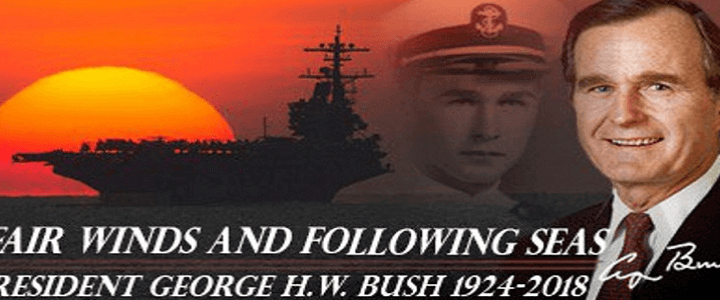George Herbert Walker Bush, the 41st president of the United States, will be remembered primarily for three things: his ill-fated promise of “read my lips: no new taxes,” his campaign’s 1988 “Willie Horton” ad, and being the father to the governors of two of the nation’s largest states, one of whom went on to become the 43rd president. But any look at the life of “Bush 41” requires an examination of his incredible contributions to the security of the nation.
The man who was often overshadowed by the often larger-than-life presidents who preceded and followed him—Ronald Reagan and Bill Clinton—was a paragon of public service who left an almost unparalleled legacy of national security accomplishments.
Born to a wealthy Yankee family in Milton, Massachusetts, Bush came from an era when the wealthy were expected to serve their country. His son, President George W. Bush, repeated the old maxim in his 2007 State of the Union address: “Our work in the world is also based on a timeless truth: To whom much is given, much is required.” Bush’s father, Prescott Bush, would eventually represent Connecticut in the U.S. Senate.
The path from Andover to the CIA
Bush graduated from the elite Phillips Academy in Andover (also the alma mater of Medal of Honor recipient Thomas Hudner) in 1942. Instead of moving on to Yale as was likely expected, he enlisted in the U.S. Navy on his 18th birthday. A year later, he was commissioned as an ensign, becoming the nation’s youngest naval aviator. He flew Avenger torpedo-bombers off carriers in the Pacific, completing a total of 58 missions. In his most memorable mission, his aircraft was raked by enemy fire but he completed his bombing run and turned for home. The plane was too badly damaged, however, and he and his two crewmates bailed out. Only Bush survived. After four hours in a life-raft, he was rescued by the submarine USS Finback. For that mission, he received the Distinguished Flying Cross.
After the war, he enrolled at Yale, where he was classmates with another future conservative luminary William F. Buckley, Jr., although Bush graduated in two and one-half years in 1948 while Buckley remained until 1950. After a stint in the oil industry, he was elected to Congress in 1966, where he was instrumental in the nation’s shift to an all-volunteer military as part of the committee that began the move towards ending the draft during the Vietnam War.
He agreed to run for Senate in 1970, losing to Democrat Lloyd Bentsen, who would ultimately be the vice presidential running mate of Massachusetts Gov. Michael Dukakis, the man Bush beat in 1988. As a consolation, Nixon appointed Bush as United Nations Ambassador. While he lost the 1971 vote in the General Assembly where the assembled nations voted to expel the Republic of China, better known as Taiwan, in favor of the People’s Republic of China, the relations forged there would serve him well.
Nixon, however, became the first U.S. president to visit the People’s Republic, opening the door to eventual diplomatic relations. After a stint running the Republican National Committee, Bush became President Gerald Ford’s representative in China in 1974. While he was not an ambassador, he built the foundations of a diplomatic relationship that paved the way for future economic ties.
Ford had a more difficult assignment for Bush, though. In the wake of the Watergate scandal, Congress held numerous hearings into the CIA’s activities, notably those led by Sen. Frank Church. These hearings uncovered many illicit and even illegal activities, dealing a blow to the agency’s credibility. In 1976, Bush took over from William Colby, becoming only the second director of central intelligence who wasn’t a military general or a carer intelligence officer. Bush’s steady hand guided the CIA through a rough period in its history and set it up to continue its work gathering foreign secrets vital to the national interest.
The White House Years
Which brings us to the part everyone knows best: he ran for president in 1980, losing the nomination to Ronald Reagan, who then chose Bush as his running mate. Many people I know voted for Reagan believing he was too old, would die in office, and Bush would become president. But Reagan did serve out his two terms, and Bush then defied history, becoming the first sitting vice president to be elected president since Martin Van Buren in 1836.
He occupied the Oval Office when the Cold War officially ended. The Berlin Wall fell, and democracy spread like wildfire across the former Soviet Bloc countries of Eastern Europe, giving him the opportunity to bring the world back from the brink. He signed the Strategic Arms Reduction Treaty with the Soviet Union, took nuclear bombers off high-alert, and further eased tensions by removing all U.S. tactical nuclear weapons from Europe and Korea.
And of course, in August 1990, Iraq’s Saddam Hussein mounted his ill-advised invasion of Kuwait, setting up Operations Desert Shield and Desert Storm. Desert Storm’s 100-hours of ground combat, during which the U.S. Army almost completely destroyed the fifth-largest army in the world, remains a textbook lesson in the application of land power.
There’s only so much that can be said about such a great man in a small space, so I’ll leave it at this: George H.W. Bush served his nation with unmatched distinction for the majority of his adult life. He leaves a legacy of public service that few will equal in the future. He is one of the last great examples of the statesmen of a bygone era. If the nation can produce a few more public servants who achieve only half of what he accomplished in his 94 years on this planet, the future of the Republic would be in good hands.
Bravo zulu, as my Navy friends say. Fair winds and following seas, skipper.




